|
|
|
Sort Order |
|
|
|
Items / Page
|
|
|
|
|
|
|
| Srl | Item |
| 1 |
ID:
173117
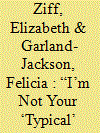

|
|
|
|
|
| Summary/Abstract |
Within the institution and military community, civilian wives of service members occupy complicated roles. On the one hand, wives are undisputedly crucial to the functioning of their service member husbands. However, wives are simultaneously considered subordinate to their husbands within the military and extended community. Indicative of this attitude are the divisive stereotypes of military wives that range from lazy and irresponsible, to overly rank-conscious and entitled. Based on combined in-depth interviews from two samples of military wives, this article investigates how the women navigate the military spouse role within the institutional, community-oriented context of the military. Specifically, we ask, how do these women construct gender and exercise agency when drawing on the stereotypes of wives within the community? By utilizing such mechanisms as symbolic boundary work, gender policing, and stereotyping, women both reify stereotypes of the military spouse and exert agency in creating the military spouse identity for themselves.
|
|
|
|
|
|
|
|
|
|
|
|
|
|
|
|
| 2 |
ID:
187106
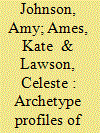

|
|
|
|
|
| Summary/Abstract |
Military spouses are situated at the junction of the military and civilian worlds. They provide necessary support to military strategic and operational objectives and are also expected to perform a traditional spousal role of the ‘good’ military wife. This article demonstrates the existence of strong military partner archetypes which guide military community norms and expectations of spousal behaviour. In 14 qualitative interviews and five focus groups with Australian military partners, participants revealed many different, yet firm, sentiments related to identity, including fierce independence; a sense of belonging; self-reliance; a desire to help others; belief in fairness and pragmatism. The archetypes outlined in this article shape how partners see their role, and how they interact with other non-military partners and the military organization. This research delivers insights into optimizing military partner services to better support spouses through deployment, relocation and other military experiences.
|
|
|
|
|
|
|
|
|
|
|
|
|
|
|
|
| 3 |
ID:
174831
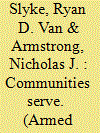

|
|
|
|
|
| Summary/Abstract |
Military veterans and their families face a multiplicity of challenges once they transition from service. Even though more American private and public-sector organizations are engaged in studying the needs of veterans and their families through need assessments, few assessments are comprehensive analyses of the challenges they face. This systematic review of 61 need assessments from 2007-2018 in the United States summarizes findings on 18 veterans issues. While most studies addressed issues relating to accessing U.S. Department of Veterans Affairs health and benefit services, mental health, employment, and homelessness, gaps in the literature emerged, particularly regarding ethnic and sexual minority, rural and elderly veterans, and National Guard/Reserve servicemembers. Large cities and states with varying degrees of military presence were frequent regions of study, with national think tanks, nonprofit organizations, and public universities conducting most need assessments. Future assessments should address persistent inequities in coverage among communities and topics of study using mixed-method research and survey design.
|
|
|
|
|
|
|
|
|
|
|
|
|
|
|
|
| 4 |
ID:
190784
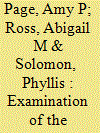

|
|
|
|
|
| Summary/Abstract |
Previous research indicates that one’s identity relates to one’s use of specific coping strategies. Exploring the relationship between self and coping in military wives is crucial to understanding how they manage military lifestyle-related stressors. The researchers hypothesized that identity status, self-concept clarity, self-monitoring, mastery, and role conflict will be related to choice of emotion-focused coping or problem-focused coping strategies. Two hundred two participants completed an anonymous online survey containing standardized scales. Ordinary least squares (OLS) regression analyses revealed that emotion-focused coping had positive relationships with achieved identity status and role conflict. Problem-focused coping had positive relationships with moratorium status, self-concept clarity, self-monitoring, and mastery. Findings provide preliminary support that sense of self is important in understanding how military wives choose to cope with particular challenges.
|
|
|
|
|
|
|
|
|
|
|
|
|
|
|
|
| 5 |
ID:
152320
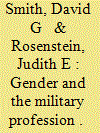

|
|
|
|
|
| Summary/Abstract |
As increasing numbers of women are recruited into the U.S. Navy, retention of women (especially in combat occupational specialties) lags behind men. Data indicate that women and men leave the Navy because of impact on their family. Lack of career persistence for women in nontraditional professions such as science, technology, engineering, and math professions has also been attributed to social psychological factors including self-efficacy, stereotype threat, and bias. We build on this research to examine the military and service academies’ socialization of women into a traditionally male profession through role model influence. Surveys were collected from students at the U.S. Naval Academy (USNA) on their work–family expectations. Results show a gendered difference in career intentions and influences by male and female non-USNA peers, but not from their families or officers. Expected work–family conflict, gender ideology, and family formation intentions were employed to explore relationships between work and family expectations.
|
|
|
|
|
|
|
|
|
|
|
|
|
|
|
|
| 6 |
ID:
169098
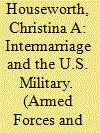

|
|
|
|
|
| Summary/Abstract |
This article uses a comprehensive descriptive analysis to examine the determinants of racial intermarriage for native-born men and women using the 2012 American Community Survey. A comparison between military and civilian samples is the main focus of the article. We improve upon the existing literature by identifying the proximity of the respondent’s current residence to a military base and including an analysis of anti-miscegenation laws by state. Further, we provide a cohort analysis to parse out generational differences. We find that military members are more likely to intermarry, regardless of cohort, and that non-White military members have higher rates of education than their civilian counterparts. Black females in the military are more educated and have a significantly higher rate of intermarriage than their civilian counterparts. Additionally, the difference in intermarriage rates between civilian and military members is 31 percentage points higher for Black women than Black men.
|
|
|
|
|
|
|
|
|
|
|
|
|
|
|
|
| 7 |
ID:
186344
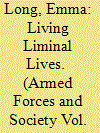

|
|
|
|
|
| Summary/Abstract |
The emotional cycle of deployment theorized by Logan and adapted by Pincus, House, Christenson, and Alder is often applied by academics and military support agencies to define, explain, and provide advice on the experiences and possible emotional reactions of military families during phases of deployment. Interviews with army partners showed that spatiotemporal experiences and perspectives are more complex than those afforded by the emotional cycle of deployment. This article argues that applying the concept of liminality uncovers some of this complexity, illuminating the in-between times experienced during deployments that are otherwise hidden. Army partners move through and between deployments and deployment phases haunted by specters of past and future deployments. By disrupting seemingly chronological and discrete spatiotemporal narratives, which often frame research on military families and deployment, this article demonstrates how army partners move through and between deployments and deployment stages negotiating past and future deployments. It shows how they continuously adapt and evolve practices while negotiating interpreted pasts and imagined futures in pursuit of becoming “ideal.”
|
|
|
|
|
|
|
|
|
|
|
|
|
|
|
|
| 8 |
ID:
160981
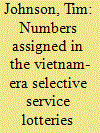

|
|
|
|
|
| Summary/Abstract |
Previous research has reported correlations between the military service records of parents and their children. Those studies, however, have not determined whether a parent’s military service causally influences an offspring’s participation in the armed forces. To investigate the possibility of a causal relationship, we examined whether lottery numbers issued to draft-eligible men during the U.S. Vietnam-era Selective Service Lotteries influenced the military participation of those men’s children. Our study found higher rates of military participation among children born to fathers whose randomly assigned numbers were called for induction. Furthermore, we perform statistical analyses indicating that the influence of lottery numbers on the subsequent generation’s military participation operated through the military service of draft-eligible men as opposed to mechanisms unrelated to service such as “draft dodging.” These findings provide evidence of a causal link between the military service of parents and their children.
|
|
|
|
|
|
|
|
|
|
|
|
|
|
|
|
| 9 |
ID:
174837


|
|
|
|
|
| Summary/Abstract |
Despite efforts to improve women’s military representation, mid-career female officers attrit at twice the rate of male peers. Research and theory suggest women’s turnover is influenced by family life including marriage and parenthood. But previous research has grouped women together, failing to extrapolate which factors influence retention of women with different family types. Thus, this study explored a single career point (mid-career) at different family intersections (married, unmarried, with, and without children) to elucidate work and family factors associated with female officers’ retention decisions. Using 2011 Air Force survey data (n = 1,309), regression models tested four hypotheses regarding work and family factors associated with different subgroups’ military life satisfaction and career intentions. Findings indicate that after accounting for satisfaction, work factors were insignificant for all subgroups, but family factors (as hypothesized) were significantly associated with married women’s career intentions. Results suggest that policies targeting family support/satisfaction may improve retention.
|
|
|
|
|
|
|
|
|
|
|
|
|
|
|
|
| 10 |
ID:
186345
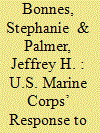

|
|
|
|
|
| Summary/Abstract |
In this article, we show how the U.S. military treats domestic violence and sexual assault as distinct forms of abuse, which has particular consequences for victims of intimate partner sexual violence. We explore how a specific U.S. military branch, the Marine Corps, complicates these issues further by providing services to intimate partner sexual violence victims from two different programs. Analyzing military orders and documents related to Family Advocacy Program and Sexual Assault Prevention and Response program, interviews with eight military prosecutors, and the experiences of one military lawyer, we examine program and interactional-level factors that shape victim services, advocacy, and processes. We find that there are program differences in specialized services, coordinated services, and potential breaches of confidentiality related to victim’s cases. We recommend that the Marine Corps recognize the intersections of sexual violence and domestic violence and offer more tailored services to victims of intimate partner sexual violence.
|
|
|
|
|
|
|
|
|
|
|
|
|
|
|
|
|
|
|
|
|